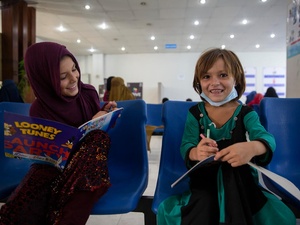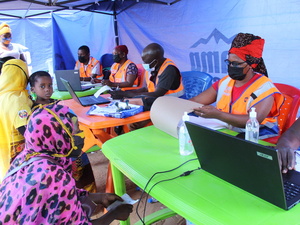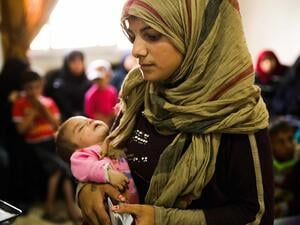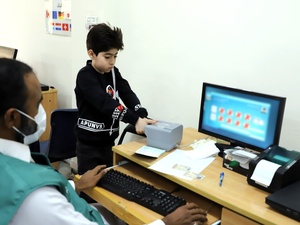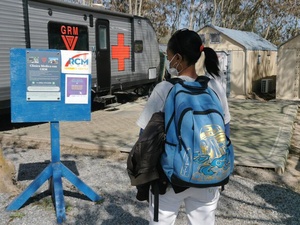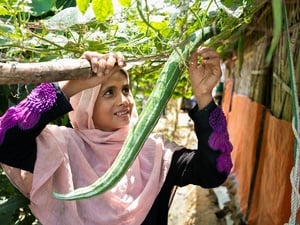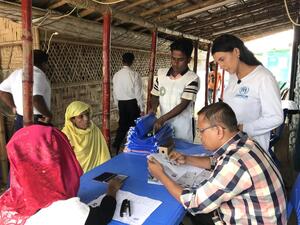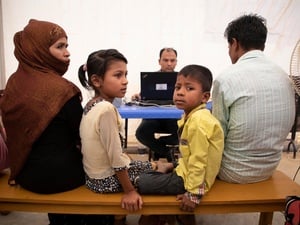Census teams seek out Afghans across Pakistan
Census teams seek out Afghans across Pakistan

A census-taker – who normally works as a teacher – interviews Afghans in Sialkot, north-east Pakistan.
SIALKOT, Pakistan, Mar. 1 (UNHCR) - Dil Mohammed manoeuvred through the narrow alleys of Bounkan district on his bicycle, dodging carts, pools of black liquid and rubbish, to arrive just in time to intercept the team of census enumerators.
"I live here, I'm the head of the household," the Pashto-speaking Afghan said to nods of agreement from neighbours gathered around the two-person team helping in the first-ever census of Afghans living in Pakistan. Dil Mohammed has lived in Sialkot since arriving from Afghanistan's Takhar province eight years ago.
With the census now underway in all four Pakistani provinces, there has so far been a positive reaction from the Afghan population. Rather than avoiding the census-takers, as some people feared might happen, most Afghans have been anxious to ensure they are included in the count.
The census teams, composed of one man and one woman so they can enter houses where men are not allowed, record only the individuals they see. That ensures there is no double counting, since men working in cities may have families in the refugee camps elsewhere in Pakistan.
The census is being conducted by the government of Pakistan, with assistance from the UN refugee agency, which is also paying for the exercise. The census was launched on 23 February in North-West Frontier Province and extended across the country over the following days. The census got underway in the last province, Balochistan, on 26 February.
Despite some logistical problems, UNHCR is confident that almost all of the work will be concluded within the 10 days originally envisaged. There might be a slight delay in mountainous Balochistan, where work has been complicated by the severest winter weather in decades.
This census will produce the first detailed profile of the Afghan population in Pakistan, with questions addressing not just names, and other basic personal data, but also sources of livelihood, areas of origin in Afghanistan and the dates when people first arrived in Pakistan.
All Afghans who have arrived since 1 December 1979, whether refugees or other groups, are required to participate. Only those Afghans who are recorded in the census will be included in a proposed later registration that could produce some sort of individual document.
The census teams are also asking Afghans if they intend to go home in 2005, the last full year of the current three-year Tripartite Agreement between UNHCR and the governments of Afghanistan and Pakistan. That agreement governs UNHCR's voluntary repatriation programme, which assists Afghans who want to return home.
However, the census is not connected to the voluntary repatriation programme, which resumes on 7 March from Pakistan after the annual suspension during the harsh Afghan winter. Instead, it is designed to help the government of Pakistan and UNHCR develop policies for managing the Afghans in Pakistan after the current Tripartite Agreement expires.
The census is a huge logistical challenge, with 1,320 two-person teams of enumerators and 300 supervisors hired by the government's Population Census Organisation. UNHCR staff are monitoring their activities to ensure agreed procedures are followed. A number of independent international observers from diplomatic missions in Pakistan are also watching the process.
"What the public sees now - census teams operating across the country for 10 days - is the product of months of negotiation and planning," said Indrika Ratwatte, the official directing UNHCR's participation. "UNHCR and the government of Pakistan agreed this was the only way to gain an accurate profile of the Afghan citizens living in Pakistan."
The actual census was preceded by months of mapping in which government teams located the areas where Afghans are living in Pakistan - ranging from large concentrations in some places to single families living in major city neighbourhoods.
The extent of the challenge was illustrated in Sialkot, a major industrial city near the border with India. Some substantial pockets of Afghans were discovered in poor areas of the city, such as Bounkan. But other families were found in isolated individual compounds in the fertile fields surrounding Sialkot.
In the historic city of Lahore, two hours drive away, one team spent an entire morning navigating the narrow streets to record a small group of rubbish collectors - one of the commonest jobs undertaken by the mainly poor and illiterate Afghans who have drifted into the cities.
At the same time, in another section of the city, census-takers were recording a community of thousands of Afghans who are living amid squalor beside the Ravi River, the ground covered either by rubbish or evil-smelling mud. Residents were anxious to take part in the census, saying they had seen little outside interest in their grim lives.
In North-West Frontier Province (NWFP), where the majority of Afghans live, the teams had spread out from the Peshawar area into the most remote parts of the province within a couple of days. Most of Pakistan's refugee camps, many dating back a quarter century, are located in NWFP.
In Balochistan, the census has been facing additional problems caused by the harshest winter in decades. At one point, heavy snow was blocking roads in a province that has suffered years of extreme drought.
The census data is relayed to a control centre in Islamabad at the end of each day and full figures are expected by the middle of March. The information contained in the data is expected to play a vital role as UNHCR and the Pakistan government begin talks on future policies for managing the diverse Afghan population that will remain behind after the end of the current voluntary repatriation agreement.
By Jack Redden
UNHCR Pakistan


